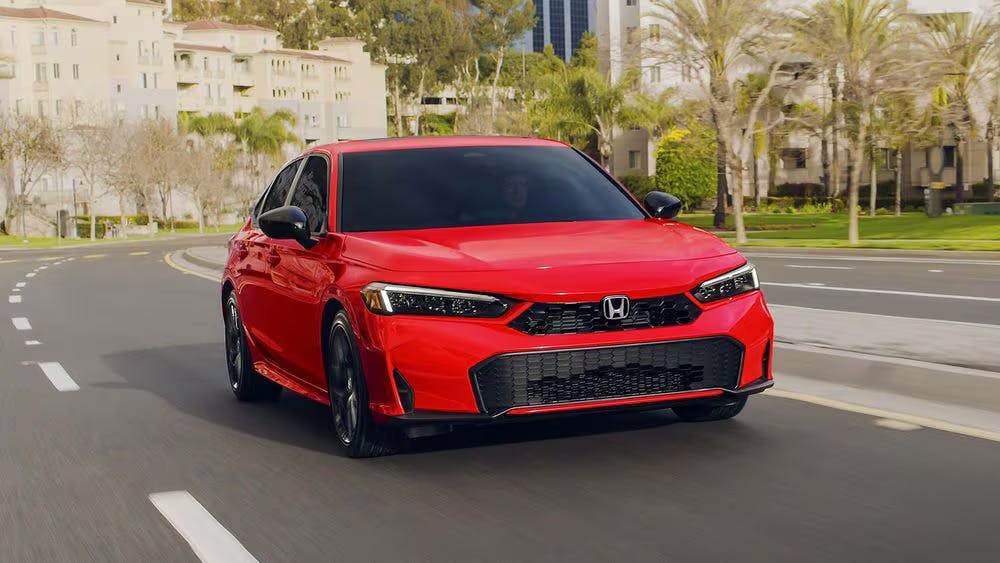Media | Articles
Report: Honda Is the First Automaker to Adjust Plans Due to Tariffs
Reuters reported, ahead of the 25 percent tariff implemented by the Trump administration on products from Mexico and Canada, that Honda will build the next-generation Civic in Indiana, instead of Guanajuato, Mexico, as was originally planned.
Citing unnamed sources, Reuters says Honda “has decided to produce its next-generation Civic hybrid in the U.S. state of Indiana, instead of Mexico, to avoid potential tariffs on one of its top-selling car models, according to three people familiar with the matter.” The Indiana plant already builds gas-powered and hybrid Honda Civics, as does the Honda plant in Alliston, Ontario, Canada. In all, Honda has built about 12 million Civics in North America, with five million of those built in the U.S.



The story said that next-gen Civic production should begin in May of 2028, with an annual estimated output of 201,000. Production was supposed to start in Mexico, where labor rates are cheaper, in November of 2027. The story cites the tariff specifically as the motivating factor for the move: “While several automakers have expressed concerns about the levies, Honda’s move is the first concrete measure by a major Japanese car company.”
Honda’s situation “underscores how potentially disruptive the U.S. tariffs would be for industries that cannot drastically alter production plans in the short term given the investment and different production lines in use for different markets,” Reuters said.

There is little doubt that the tariffs will affect auto prices. Anderson Economic Group, a boutique consulting firm based in East Lansing, Michigan, released a widely-cited study that said the tariffs could raise prices by as much as $12,000. That would be for electric vehicles, the firm said; other models would have smaller increases. For a small SUV, the price could go up by $4000, and $8000 for pickup trucks. Anderson CEO Patrick Anderson told CBS that, “Our analysis shows the proposed tariffs would have a very big effect on North American assembled cars by multiple automakers.”
Marketplace
Buy and sell classics with confidence
If Reuters is correct, the next-generation Civic will be built at Honda Manufacturing of Indiana, located in Greensburg. The plant began production of Honda Civics in October of 2008. The company announced in 2023 that it was moving all Accord production to Indiana from the plant in Marysville, Ohio, as that facility transitions to electric vehicles. The move “will maintain production volume of an important core model for Honda customers, while enabling [Marysville] to transition to EV production,” Honda said in the announcement two years ago. Honda declined comment on the Reuters story.

The current Civic model is a strong seller for Honda. For February, the Civic, which is Honda’s oldest auto nameplate, led Honda passenger cars with U.S. sales of more than 18,000 units, with a third of those sales being the Civic hybrid, that model’s best month ever. In January, the 2025 Civic hybrid was named the North American Car of the Year by a group of 50 automotive journalists from the U.S. and Canada.
The current Civic is the 11th generation of the model, redesigned for 2022. Honda first introduced the Civic in Japan in 1972, and sent it to America a year later. It was “heralded for its fun-to-drive dynamics, quality construction and world-class fuel efficiency, qualities that have defined every generation since,” says the company.









Why not just import their cars from Japan, tariff free?
Honda just made a statement saying this is false. Shocker
Their exact statement was “Honda has made no such announcement and will not comment on this report.” Sounds like they are still negotiating.
Agree with you fully.
I agree with you
Please note story stated Civic also built in Canada. I’m confident that plant can supply demand in Canada.
I can’t afford a new car now much less add on 25 percent. How will tariffs be used? Pay down national debt or more tax breaks?
Plenty of manufacturing is done here so any done here will not have to worry. Companies moving their production from the USA to Mexico, etc. will have to be concerned.